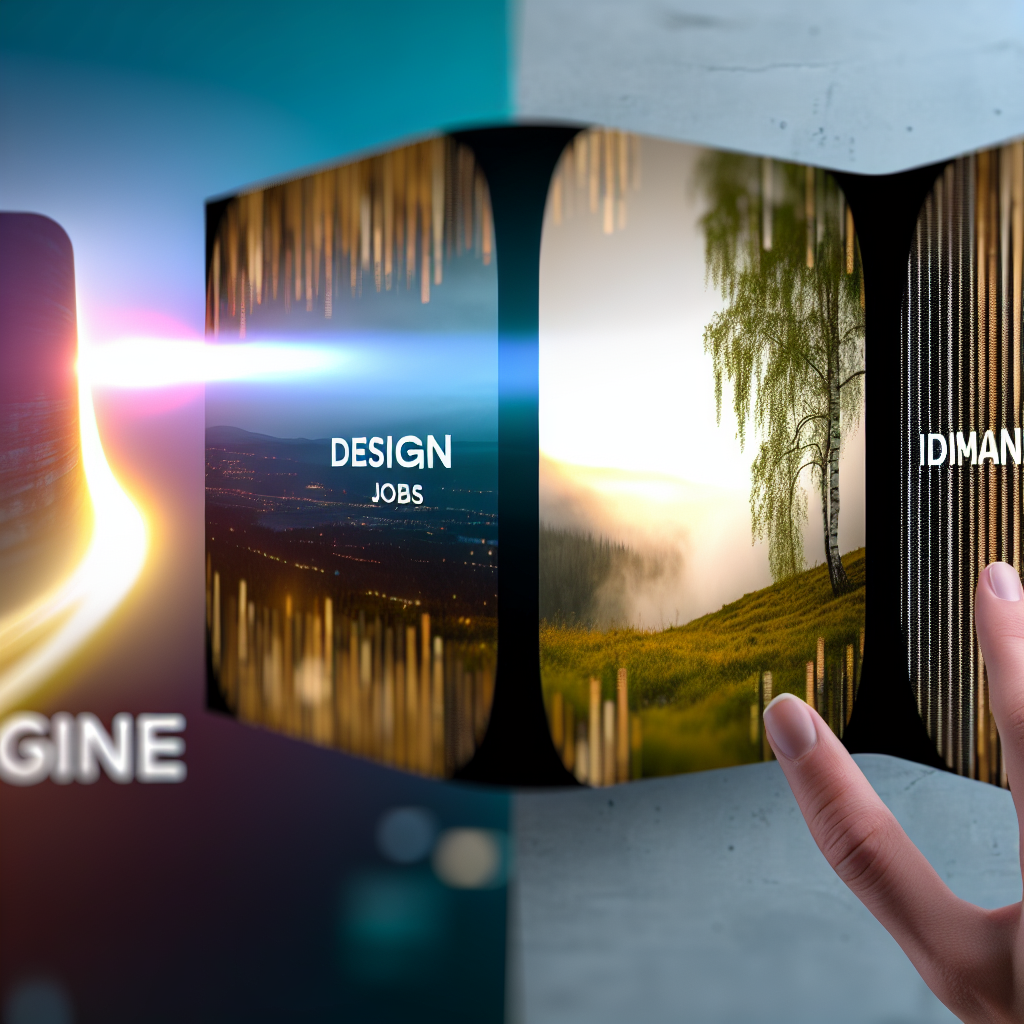The Role of Design Managers in the Future Job Market
Design Management Jobs: Career Description in 2024
The Role of Design Managers in the Future Job Market
In today’s rapidly evolving job market, it is crucial to stay ahead of the curve and anticipate the skills and roles that will be in demand in the future. One such field that is expected to see significant growth is design management. Design managers play a vital role in bridging the gap between creativity and business strategy, ensuring that design projects are not only aesthetically pleasing but also aligned with the organization’s goals and objectives.
As we look ahead to 2024, the role of design managers is expected to become even more critical. With the increasing emphasis on user-centered design and the integration of technology into every aspect of our lives, organizations will rely on design managers to lead the way in creating innovative and user-friendly products and services.
One of the key responsibilities of design managers in the future will be to foster collaboration and cross-functional teamwork. As design becomes more integrated into various departments within an organization, design managers will need to work closely with marketing, engineering, and other teams to ensure that design decisions are aligned with the overall business strategy. This will require strong communication and leadership skills, as well as the ability to navigate complex organizational structures.
In addition to collaboration, design managers will also need to have a deep understanding of emerging technologies and trends. With the rapid advancement of artificial intelligence, virtual reality, and other disruptive technologies, design managers will need to stay up-to-date with the latest tools and techniques to effectively incorporate these innovations into their design processes. This will not only require a willingness to learn and adapt but also the ability to think critically and creatively about how these technologies can be leveraged to enhance the user experience.
Furthermore, design managers will play a crucial role in driving innovation within their organizations. As competition in the marketplace intensifies, organizations will need to differentiate themselves through unique and compelling design. Design managers will be responsible for fostering a culture of innovation, encouraging their teams to think outside the box and push the boundaries of traditional design. This will require a combination of strategic thinking, creative problem-solving, and a deep understanding of consumer behavior and market trends.
As the demand for design managers continues to grow, so too will the opportunities for career advancement. Design managers who demonstrate exceptional leadership and strategic thinking skills may have the opportunity to move into executive-level positions, such as Chief Design Officer or Vice President of Design. These roles will involve overseeing the design strategy for the entire organization and working closely with top-level executives to drive business growth and success.
In conclusion, the role of design managers in the future job market will be critical in driving innovation, fostering collaboration, and integrating emerging technologies into the design process. As organizations recognize the value of design in creating a competitive advantage, the demand for skilled design managers will continue to rise. Those who possess a combination of creative, strategic, and leadership skills will be well-positioned to thrive in this exciting and evolving field. So, if you have a passion for design and a desire to make a meaningful impact, a career in design management may be the perfect fit for you.
Key Skills and Qualifications for Design Management Careers
Design Management Jobs: Career Description in 2024
In the ever-evolving world of design, the role of design managers has become increasingly crucial. These professionals are responsible for overseeing the creative process and ensuring that projects are completed successfully. As the demand for design management jobs continues to grow, it is essential to understand the key skills and qualifications required for a successful career in this field.
One of the most important skills for design managers is strong leadership abilities. These professionals must be able to inspire and motivate their teams, guiding them towards achieving the project’s goals. Effective communication is also vital, as design managers need to clearly convey their vision to both their team members and clients.
Additionally, design managers must possess excellent problem-solving skills. They need to be able to identify potential issues and find innovative solutions to overcome them. This requires a combination of analytical thinking and creativity, as design managers must balance practicality with aesthetics.
A deep understanding of design principles and trends is another essential qualification for design management careers. Design managers must stay up-to-date with the latest industry developments and be able to apply this knowledge to their projects. This includes having a strong grasp of color theory, typography, and layout design.
Furthermore, design managers must have a solid foundation in project management. They need to be able to create and manage budgets, set realistic timelines, and allocate resources effectively. This requires strong organizational skills and the ability to prioritize tasks.
In addition to these technical skills, design managers must also possess a range of interpersonal skills. Collaboration is a key aspect of design management, as these professionals often work closely with clients, designers, and other stakeholders. The ability to build and maintain relationships is crucial, as design managers need to understand and meet the needs of various individuals and groups.
Flexibility and adaptability are also important qualities for design managers. The design industry is constantly evolving, and design managers must be able to embrace change and adapt their strategies accordingly. This includes being open to new technologies and tools that can enhance the design process.
To succeed in a design management career, a combination of education and experience is typically required. Many design managers hold a bachelor’s or master’s degree in design, business, or a related field. These programs provide a solid foundation in design principles, project management, and business strategy.
Gaining practical experience through internships or entry-level positions is also valuable. This allows aspiring design managers to apply their knowledge in real-world settings and develop their skills further. As they progress in their careers, design managers can take on more significant responsibilities and work on larger, more complex projects.
In conclusion, design management jobs offer exciting opportunities for individuals with a passion for both design and leadership. To excel in this field, design managers must possess a range of skills and qualifications, including strong leadership abilities, effective communication, problem-solving skills, and a deep understanding of design principles. Additionally, a solid foundation in project management and interpersonal skills is essential. By combining education, experience, and a willingness to adapt, aspiring design managers can thrive in this dynamic and rewarding career.
Emerging Trends and Technologies in Design Management Jobs
Design Management Jobs: Career Description in 2024
In the ever-evolving world of design, staying ahead of emerging trends and technologies is crucial for professionals in design management. As we look ahead to 2024, it is clear that the landscape of design management jobs will continue to evolve, presenting exciting opportunities for those in the field.
One of the most significant emerging trends in design management is the integration of artificial intelligence (AI) and machine learning. Designers are increasingly using AI-powered tools to streamline their workflows and enhance their creative processes. This technology can analyze vast amounts of data and generate insights that can inform design decisions. Design managers who are well-versed in AI and machine learning will be in high demand, as they can leverage these tools to drive innovation and efficiency within their teams.
Another emerging trend in design management is the growing importance of sustainability and ethical design practices. With increasing awareness of environmental issues, consumers are demanding products and services that are eco-friendly and socially responsible. Design managers who can incorporate sustainable design principles into their projects will be highly sought after. This includes using materials and manufacturing processes that minimize environmental impact, as well as considering the social and cultural implications of design choices.
In addition to AI and sustainability, virtual and augmented reality (VR/AR) technologies are also set to play a significant role in design management jobs in 2024. VR/AR can provide immersive experiences that allow designers and clients to visualize and interact with designs in a virtual environment. Design managers who can harness the power of VR/AR will be able to communicate their ideas more effectively and collaborate with stakeholders in new and exciting ways.
As the design industry becomes increasingly globalized, design managers will also need to possess strong cross-cultural communication and collaboration skills. Working with diverse teams and clients from different cultural backgrounds requires an understanding of cultural nuances and the ability to adapt design strategies accordingly. Design managers who can navigate these complexities will be able to foster creativity and innovation across borders.
Furthermore, the rise of remote work and digital collaboration tools has transformed the way design teams operate. Design managers must be adept at managing remote teams and facilitating effective communication and collaboration in virtual environments. This includes utilizing project management software, video conferencing tools, and other digital platforms to ensure seamless workflow and efficient project delivery.
In conclusion, the field of design management is poised for exciting developments in the coming years. Design managers who stay abreast of emerging trends and technologies, such as AI, sustainability, VR/AR, cross-cultural communication, and remote work, will be well-positioned for success in 2024. By embracing these advancements, design managers can drive innovation, enhance collaboration, and create impactful designs that meet the evolving needs of consumers and society as a whole.
Challenges and Opportunities in Design Management Careers
Design Management Jobs: Career Description in 2024
Challenges and Opportunities in Design Management Careers
Design management is a field that has seen significant growth in recent years, and this trend is expected to continue into 2024. As the demand for innovative and visually appealing products and services increases, so does the need for skilled professionals who can effectively manage the design process. However, with this growth comes a unique set of challenges and opportunities that design managers must navigate.
One of the main challenges in design management careers is the ever-evolving nature of technology. With advancements in digital tools and software, design managers must constantly stay updated on the latest trends and techniques. This requires a commitment to lifelong learning and a willingness to adapt to new technologies. Design managers who can effectively leverage these tools will have a competitive edge in the job market.
Another challenge in design management careers is the need to balance creativity with business objectives. Design managers must not only have a keen eye for aesthetics but also a deep understanding of market trends and consumer preferences. They must be able to translate these insights into design strategies that align with the overall business goals. This requires a unique blend of artistic vision and strategic thinking.
In addition to these challenges, there are also numerous opportunities in design management careers. With the increasing emphasis on sustainability and ethical design, there is a growing demand for professionals who can integrate these principles into their work. Design managers who can create environmentally friendly and socially responsible designs will be highly sought after by companies looking to enhance their brand image.
Furthermore, the globalization of markets has opened up new opportunities for design managers. As companies expand their operations internationally, they need professionals who can navigate cultural differences and create designs that resonate with diverse audiences. Design managers who have a global mindset and can adapt their designs to different cultural contexts will have a competitive advantage in the job market.
Another opportunity in design management careers is the rise of remote work. With advancements in technology, many design managers now have the flexibility to work from anywhere in the world. This opens up new possibilities for collaboration and allows design managers to work with clients and teams from different countries. However, it also requires strong communication and project management skills to effectively coordinate remote teams.
In conclusion, design management careers offer both challenges and opportunities in 2024. Design managers must stay updated on the latest technologies and trends, while also balancing creativity with business objectives. They have the opportunity to create sustainable and culturally relevant designs, and the flexibility to work remotely. By navigating these challenges and leveraging these opportunities, design managers can thrive in this dynamic and evolving field.







Leave a Reply
You must be logged in to post a comment.